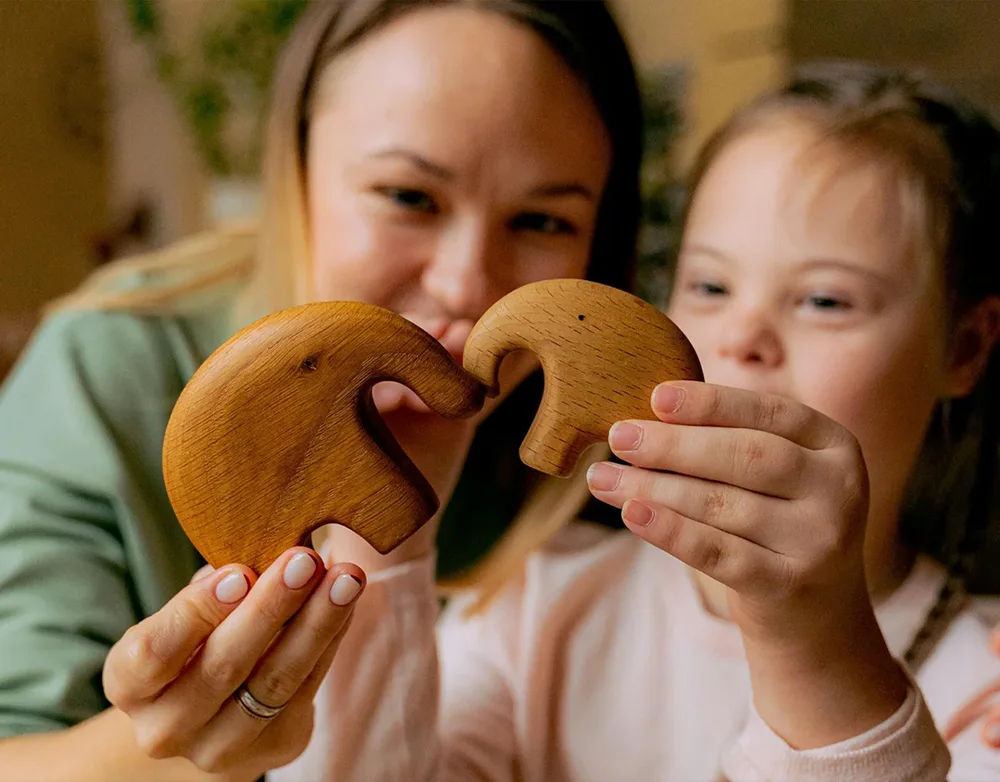What is NDIS occupational therapy?
NDIS occupational therapy services help individuals with permanent and significant disability to participate in everyday life and lead healthy, independent lives. NDIS occupational therapists work with NDIS participants across the lifespan to provide a range of supports, services, aids and strategies to do everyday tasks that are challenging. NDIS occupational therapists are qualified allied-health professionals.
How does it work with the NDIS?
The National Disability Insurance Scheme (NDIS) will fund NDIS occupational therapy services for participants who have funding for capacity-building supports in their NDIS plan.

Benefits of occupational therapy services
Occupational therapy services help individuals build their skills and increase their independence. They empower individuals to participate in meaningful activities or routines, manage daily routines at home and in the community, and modify daily tasks to make them easier to perform.
Occupational therapy can help in these key ways:
- Modifying the environment – Such as setting up a home to enable independence – which could be as minor as a grab-rail or as major as a redesign to allow proper access.
- Building skills – For example social skills, organisational skill or fine motor skills.
- Adapting tasks – Finding a different way to achieve the result.
- Identifying the right aids – Such as assistive technology or equipment – and making sure these work well for you.
- Strategies for certain situations – For example, sensory processing strategies to help you respond to sensory information.
Who can benefit from NDIS occupational therapy?
Because occupational therapy is about helping you to overcome challenges in everyday tasks, it applies to any type of disability, whether it’s related to a physical disability or a psychosocial or mental health related disability.
Occupational therapy could provide support to:
- A child with a development delay to improve their hand-eye coordination.
- Somebody with a psychosocial disability or neurological condition with strategies to remember appointments.
- A person with a physical disability to make home modifications or find assistive technology that will increase independence.

How to find occupational therapists
The NDIS-registered service provider search tool or ‘provider finder’ is a great place to start to find occupational therapy service providers in your local area. You can also search online for service providers near you and contact them directly.
Getting appointments to see occupational therapists in your local area can be more difficult than it sounds as many cities and regions are facing health professional shortages. We’re hearing of people being on waiting lists for over a year, and many clinics have even closed off their waiting lists. This can be really disheartening when you really need professional help from an NDIS occupational therapist.
So it’s worth considering online occupational therapy. Because the sessions are online, it doesn’t matter if your therapist is local or on the other side of Australia, because your appointments are by video or phone instead of in-person. This opens up many more options for finding occupational therapists. For those in rural or regional areas, in particular, this means occupational therapy services are so much more accessible. Learn how virtual appointments work.
There is currently no wait list to see Goal Coach’s experienced occupational therapists – you can book an appointment now.
If you have an NDIS support coordinator they can also help you to find occupational therapists.
What to expect from NDIS occupational therapists
Occupational therapists can help individuals identify interests and goals, manage daily routines, modify daily tasks, and recommend activities to participate effectively in. They work closely with individuals to develop skills and strategies for everyday activities.
Occupational therapists work across a wide range of solutions to a wide range of challenges. They might suggest strategies for challenges arising from a psychosocial disability, or they might help you with home modifications for a physical disability.

Maximising Support with NDIS Funding
What type of NDIS funding do I need to access occupational therapy?
The first thing is to make sure you have available funding that can be used for occupational therapy. Occupational therapy services come under the ‘capacity building’ category, which is all about improving your skills and independence.
The sub-category that covers occupational therapy is ‘improved daily living’. It’s a good idea to make sure there is funding in this category before you make an occupational therapy appointment.
Your ‘improved daily living’ budget will have a set amount of funding for the duration of your plan. So it’s helpful to work out what services that amount needs to cover – is it just for occupational therapy or does it need to pay for other services as well? Once you know about how much funding you can use for occupational therapy, you can start to work out how many sessions that will cover.
Often telehealth appointments are cheaper than when you have an appointment at a clinic, which means you can fit more sessions within your budget. Some occupational therapists only offer online appointments, which means they don’t need to cover the cost of running a clinic and this makes their fees lower. You can even show your occupational therapist your home setup over the video, without needing to pay extra fees for a home visit.
Double-check how long your plan goes for, so you know how long you have to make those sessions last.

How to use your funding to achieve your goals
As your NDIS plan will only cover a certain number of sessions, you’ll want to make each session count! Here are some ideas for getting the most out of each session:
- Get in the zone. Taking some time to be mentally ready for your session can really help. Think about what you covered last session, the progress you’ve made since then, and whether there are any recent changes in your situation that you need to discuss with your occupational therapist.
- Leave some extra time to get to your appointment, or consider an online appointment. Even if you do have services relatively close by, the travel and parking and rushing around aren’t usually much fun. Being in an unfamiliar environment in itself can be stressful for some people. So the ability to have your appointment from home can help you to focus on the therapy and get the most out of your session.
- Do the work. It’s true that you get out what you put in. Unfortunately, your occupational therapist can’t do it all for you – you also need to put in the effort in order to get the results. So try not to skip sessions, remember to do your homework, and you’ll get great benefits in the long run – it’ll all be worth it!
- Focus on your goals. Be patient with your progress and remember every little step gets you closer to your long-term goals.

Working with Occupational Therapists
Is occupational therapy right for you?
Occupational therapy covers a wide range of challenges and ways to overcome them, so the chances are it will provide some benefit. However, you want to be sure you’re getting the best help at the most appropriate time, for your personal situation, so it pays to make sure you have a good understanding of what occupational therapy can do for you before you get started.
Usually, your first session will involve an occupational therapy assessment by an experienced occupational therapist, so they can get a clear understanding of the challenges you are facing and how occupational therapy can help you. This might include a functional assessment, where your therapist assesses the tasks that are challenging because of your disability, and the impact on your day-to-day living.
Goal Coach offers a free 15-minute online chat to discuss your personal situation and what our occupational therapy service can help with.

Setting goals and developing a personalised plan with your occupational therapist
You and your occupational therapist can work together to identify interests and goals, and develop a plan to achieve them. Your occupational therapist will help you develop skills and strategies for everyday activities.
In NDIS occupational therapy sessions, your therapist will discuss the activities or situations you’re having trouble with and will work with you on solutions. Occupational therapy can help with a wide range of conditions and disabilities, for both adults and children.
The possible answers to challenges can also be varied – your situation is unique and so you’ll need a solution that’s just right for you. Some examples of what occupational therapists might look at include:
- Modifying the environment, like setting up a home to enable independence – which could be as minor as a grab-rail or as major as a redesign to allow proper access.
- Building your skills, for example social skills or organisational skills.
- Adapting tasks
- Supporting child and adolescent development, for example, with play therapy, positive behaviour support, or improving hand-eye coordination.
- Identifying the right aids, assistive technology or equipment.
- Strength and conditioning, such as improving fine motor skills.
- Giving you strategies for navigating certain situations, for example, sensory processing strategies to help you respond to sensory information.
In all these circumstances, the aim of occupational therapy is to allow individuals more independence and a better quality of life. This is exactly what the NDIS is for, and it’s very common for plans to include funding for occupational therapy services.
Your occupational therapist can help you to develop a personalised plan which can help you use your funding to access occupational therapy aids and services, including assistive technology, home modifications, and respite care housing assessments.
Your occupational therapist will also work with you to develop strategies to manage setbacks and stay motivated. Work with your occupational therapist to identify meaningful occupations and activities. Develop a plan to re-engage in these activities, with support from your occupational therapist.
Building a strong therapeutic relationship
Establishing a strong working relationship with your therapist will be helpful to getting great results. Communicate openly and honestly with your occupational therapist so that you work together to identify barriers and develop a plan to overcome them.
Be open and honest with your occupational therapist about your goals and expectations. Ask questions and seek clarification on any aspects of your plan

How Can Goal Coach Help You With Your NDIS Occupational Therapy Support
Whatever your situation, occupational therapy is a great way to get practical support and make real progress in your everyday life. Goal Coach’s friendly and experienced occupational therapists are available for appointments now, wherever you are in Australia. Get started with our free 15-minute consultation.










